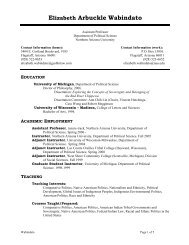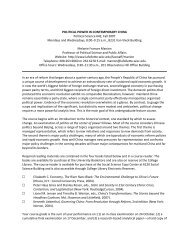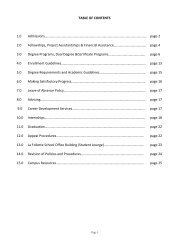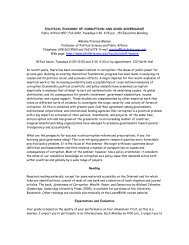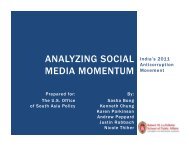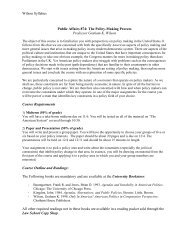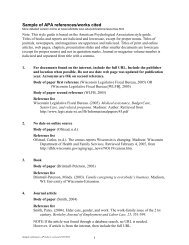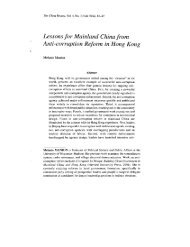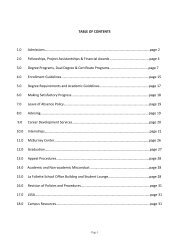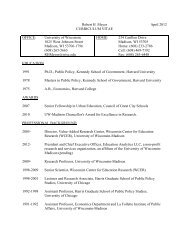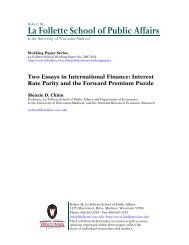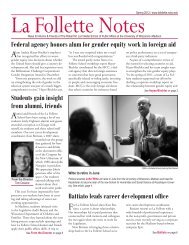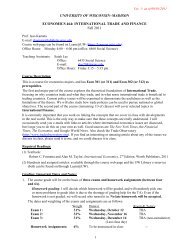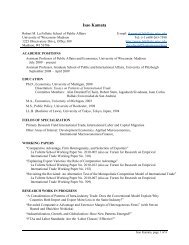SAVE Commission's findings - La Follette School of Public Affairs ...
SAVE Commission's findings - La Follette School of Public Affairs ...
SAVE Commission's findings - La Follette School of Public Affairs ...
You also want an ePaper? Increase the reach of your titles
YUMPU automatically turns print PDFs into web optimized ePapers that Google loves.
each other, society pays the price. Recommendations<br />
result in better focus on generational<br />
services and alert the state to a significant fiscal<br />
challenge caring for elderly after 2000.<br />
Goal #7: <strong>La</strong>nd Use—Wisconsin citizens<br />
love the state’s landscape and natural resources.<br />
Recommendations encourage a serious discussion<br />
on how to best manage and protect<br />
Wisconsin’s distinctive landscape<br />
in the years ahead.<br />
Goal #8: The New Infrastructure—Technology<br />
and<br />
the need to limit spending and<br />
debt are changing rules on<br />
constructing, owning and<br />
managing buildings. Recommendations<br />
say go slow on<br />
new building. They also say<br />
transform the state’s building<br />
options on who builds, pays,<br />
owns, uses and manages the<br />
infrastructure.<br />
Goal #9: The Knowledge<br />
Economy—For Wisconsin to<br />
compete successfully in the<br />
21st Century knowledge<br />
economy, it must think differently about its<br />
economic development strategy. Recommendations<br />
tap Wisconsin’s exceptional public and<br />
private sector knowledge assets in a more global<br />
marketing strategy to sell what we know, as<br />
well as what we make.<br />
Goal #10: Lifelong Learning—The formal<br />
education system was designed on an assembly<br />
line model that assumed learning stopped<br />
at graduation. The system is not designed to<br />
deliver lifelong learning in an economy in which<br />
jobs become obsolete in years, not decades. Recommendations<br />
begin restructuring the entire<br />
educational system, anchored in the parent’s responsibility<br />
as first teachers and the citizen’s responsibility<br />
to learn throughout life, using a<br />
“seamless” education system.<br />
Goal #11: Community Learning Centers—<br />
Wisconsin’s 2,250 underused school buildings<br />
have great potential to serve the educational and<br />
community needs <strong>of</strong> young and old if they are<br />
managed as one system. Recommendations <strong>of</strong>fer<br />
ideas on improving building conditions and<br />
providing all children with equitable teaching,<br />
in a quality building that can be used for learning,<br />
recreation and gathering—night and day.<br />
“This Commission<br />
has a place in history.<br />
There are others who<br />
would give their right<br />
arm to be at this<br />
table. You have an<br />
historical calling to<br />
exercise with a sense<br />
<strong>of</strong> love for the state.”<br />
David Prosser, Legislator<br />
Goal #12: Information Age Utility—Hightech,<br />
convenient, cost-effective delivery <strong>of</strong> government<br />
and educational information is a prerequisite<br />
for the 21st Century. Recommendations<br />
stop duplication among existing functions<br />
and create a way to deliver information services<br />
through a specially chartered utility that can<br />
meet a wide range <strong>of</strong> needs in education, public<br />
involvement, citizen networking,<br />
government deliberations,<br />
commerce, safety and<br />
courts.<br />
Goal #13: Our University—The<br />
University <strong>of</strong> Wisconsin<br />
System is a world-class<br />
asset that is now, and should<br />
continue to be, central to the<br />
state’s economic future. It<br />
needs to be given more flexibility,<br />
while being held accountable.<br />
Recommendations<br />
specify where that flexibility<br />
should occur and challenge<br />
the UW to make tough decisions<br />
on meeting today’s fiscal<br />
and educational realities.<br />
Goal #14: Using Technology—Government<br />
support <strong>of</strong> technology will be a factor in<br />
how effectively citizens are served in the future.<br />
Recommendations outline a funding approach<br />
to help state and local government incorporate<br />
cost-saving technology in ways that<br />
provide better service, lower cost and greater<br />
value for citizens.<br />
Goal #15: Quality Service—Citizens expect<br />
government service to be as efficient and<br />
convenient as they experience in the consumer<br />
world. Recommendations create a “one stop<br />
shopping,” customer-driven approach to information,<br />
licenses and simple permits that all state<br />
agencies and even local government can share<br />
to provide convenient, friendly service to citizens.<br />
Goal #16: Continuous Renewal—Government<br />
does a good job <strong>of</strong> starting programs and<br />
a poor job <strong>of</strong> stopping what is unnecessary. Recommendations<br />
propose a way to end rules, tax<br />
breaks, programs and committees that we no<br />
longer need. The recommendations also set up<br />
a system to ask better questions—especially fiscal<br />
questions—before governments approve<br />
costly ideas in the first place.<br />
James E. Burgess<br />
Chairman, Commission<br />
for the Study <strong>of</strong><br />
Administrative Value<br />
and Efficiency<br />
Thomas L. Lyon<br />
Vice Chairman,<br />
Commission for the<br />
Study <strong>of</strong> Administrative<br />
Value and Efficiency<br />
Senator Margaret A.<br />
Farrow<br />
Vice Chairman,<br />
Commission for the<br />
Study <strong>of</strong> Administrative<br />
Value and Efficiency<br />
Paul Light, University<br />
<strong>of</strong> Minnesota<br />
“There are always<br />
second guessers. The<br />
media, academics,<br />
legislators and other<br />
politicians, all waiting for<br />
failure and mistakes so<br />
they can criticize. You<br />
must push the envelope<br />
and take those risks.”<br />
CITIZEN • COMMUNITY • GOVERNMENT — WISCONSIN: THE 21 ST CENTURY 5



